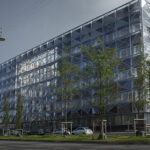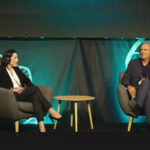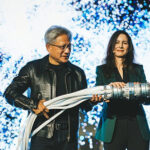Location is secret ingredient for start-up developing cancer detector
Cancer cells are hard to spot. Surgeons rely on sight, touch, and tissue analysis when they remove cancer tissue, and they don’t always get it all. Now, a start-up located in Copenhagen Science City is developing a new tool to identify diseased cells during surgery. A luminous drug that binds only to aggressive cancer cells make tumours light up and enables a complete surgery. The company, FluoGuide, has done all its research, and most of its development, within the innovation district. By Jes Andersen.
Difficult to pigeonhole for investors
Aggressive cancers spread using the enzyme uPAR (urokinase plasminogen activator receptor) which chews into normal tissue. In 2018 University of Copenhagen professor and Rigshospitalet chief physician Andreas Kjær and his research team came up with the idea to bind luminous particles to these enzymes. He started building a company based on this insight and teamed up with the seasoned entrepreneur Morten Albrechtsen. Albrechtsen’s job was to help in the development and commercialisation of the invention.
We are a one-of-a-kind company that does not fit into the classic investors’ boxes of either drug, device, or tech. Our products are drugs because they have a potential pharmacological effect, but more device-like because the surgeon needs a near-infrared light source and surgical equipment during the cancer surgery. We like to think that we are developing various tools where the common denominator is the ability to bind to these cancer-enzymes”: Morten Albrechtsen, CEO, FluoGuide.
Walking distance to collaborators
The company had a very successful IPO on the Danish branch of the Swedish stock market – Spotlight – in 2019. Fluoguide remains a Danish company and is located in… not just Denmark or Copenhagen, but very specifically in the Copenhagen Science City based start-up community COBIS. This has kept them within walking distance of pre-clinical research at professor Kjær’s laboratory at University of Copenhagen, and the university hospital Rigshospitalet, where Kjær is chief physician at the Department of clinical physiology and nuclear medicine.
I have always been very happy that so many of our collaborators are so close by. For example when we did our “First in Man” trial at the neurosurgery department at Rigshospitalet. Here we could help with the practical handling of our product while the surgeons could focus on the surgery”: Morten Albrechtsen, CEO, Fluoguide.
Working to remain a great place for R&D-companies to grow
So far, the company has raised approximately 15 mio Euro. Albrechtsen anticipates a journey where the company keeps growing and developing new drugs and other products for a long time. Growth-companies like these are very much on the Copenhagen Science City-radar.
We are seeing an increase in start-ups that scale up, but still want to stay in our innovation district to have scientific co-creators and talent close by. This increased need for suitable office-space is a high priority and we work with all relevant stakeholders to provide the needed developments”: Kristoffer Klebak, Head of secretariat, Copenhagen Science City.
Versatile compound on fast track from lab to patients
FluoGuides’ first product, FG001, has completed phase 2 medical trials for guiding surgery in three indications: Aggressive cancers of the brain, head-and-neck, and lung. FG001 also undergoes development for photothermal therapy. Here the compound heats up, so that cancer cells it binds to are killed.
About Copenhagen Science City
Join us in Copenhagen Science City – a world-class innovation district where you can transform your bright ideas into growth, jobs, and global solutions.
- Co-locate with University of Copenhagen, University Hospital Rigshospitalet, University College Copenhagen (KP) and 500 innovative companies.
- Co-create with 40,000 researchers, staff and students.
- Collaborate to develop new solutions to societal challenges.
- Find a job with leading academic institutions and deep-tech companies.
Learn more about our organisation:




